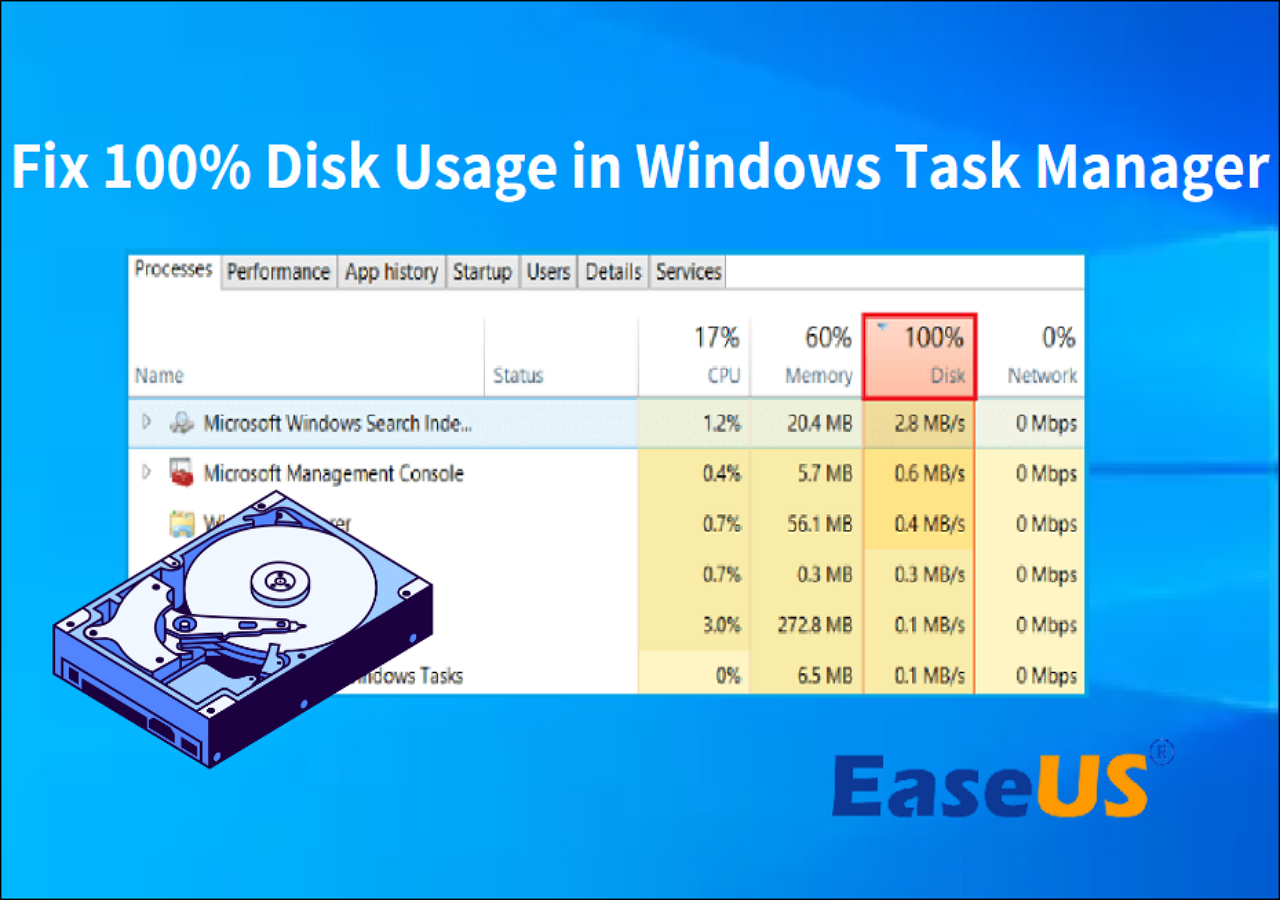Page Table of Contents
About the Author
Hot Topics
Updated on Aug 21, 2024
To Reader: This page focus on guiding you to create partitions in Windows 11/10/8.1/8/7 and Vista, XP successfully.
In this article, you'll learn:
- What Is a Hard Drive Partition
- What Tools Can You Use to Create Partition
- Method 1. Create Partition with Disk Management
- Method 2. Use Diskpart to Create Partition
- Method 3. Run Third-party Partition Manager Software to Create Partition
What Is a Hard Drive Partition and Why Do You Need to Create Partitions in Windows
Briefly, the partition is a logical location or directory that Windows users create on a hard drive or SSD disk using disk storage space to save files, store data, and even install programs. Partition is also defined as regions (via Wikipedia) that can be managed separately.
Creating partitions is the first step of preparing a disk for OS installation or data stored on a Windows computer. To make use of a hard drive or SSD, you'll need to partition the hard drive or create partitions on Windows computers.
According to the disk partitioning statics as collected in EaseUS Partition Maser as shown here in the infographic, it's clear that creating a partition is one of the top demands around worldwide users:
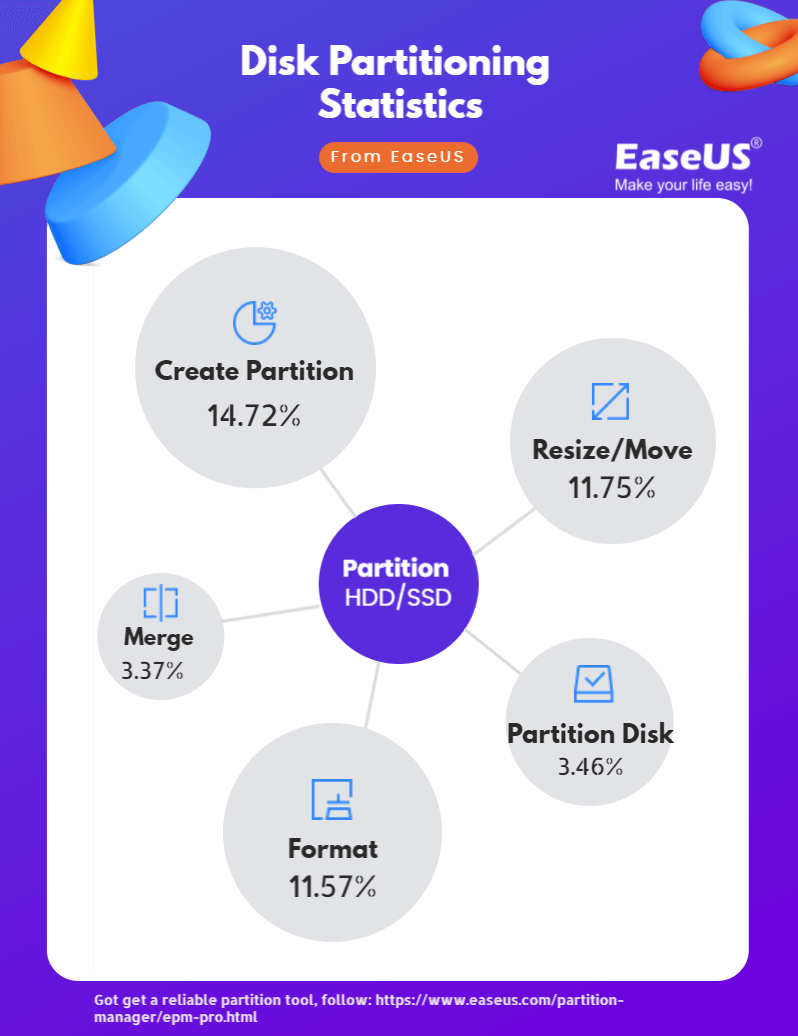
Share this Image On Your Site
So how do you create a partition on disk drives, or how do you partition a hard drive in Windows computers? Following the next part, you'll find a reliable disk management tool for disk partitioning.
What Tools Can You Use to Create Partition? 3 Windows Disk Management Tools Recommend
While searching online, you may have come across the answer to "How to create a partition in Windows" by using Disk Management. Or, some experienced users may also recommend you try the DiskPart command lines for partitioning hard drives.
So, what tools can you apply to make a new volume on your hard drive or external storage devices? And which one suits you better? Here we collected 3 most commonly used disk partitioning tools that all Windows users can apply any one of them for help:
#1. Disk Management
- Overview of Disk Management by Microsoft.
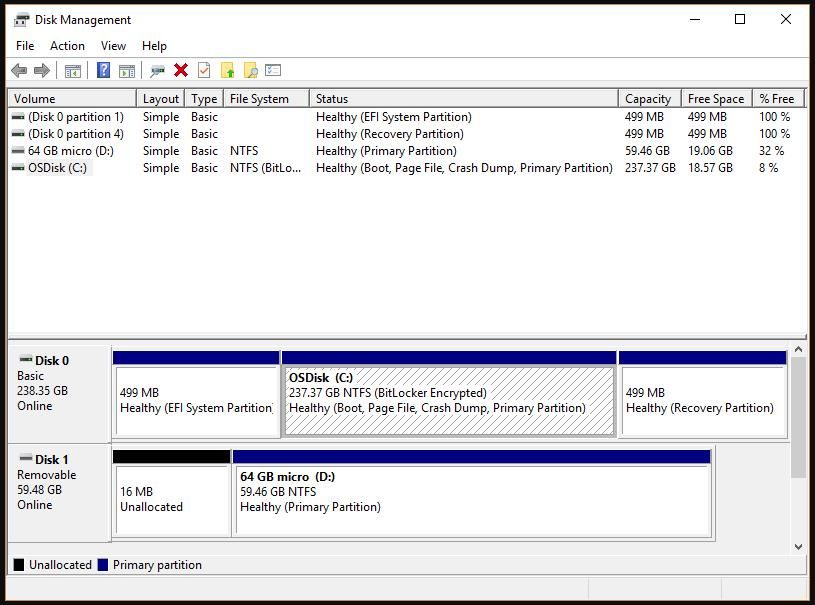
According to the description provided by Microsoft, we can clearly learn that Disk Management is a Windows built-in utility to help people manage disk partitions and even performs some advanced tasks on their storage devices.
Applies to: Windows 11/10/8.1/8/7/XP/Vista and Windows Server 2022/2019/2016/2012 r2/2012/2008, etc.
#2. Diskpart
- Diskpart by Microsoft
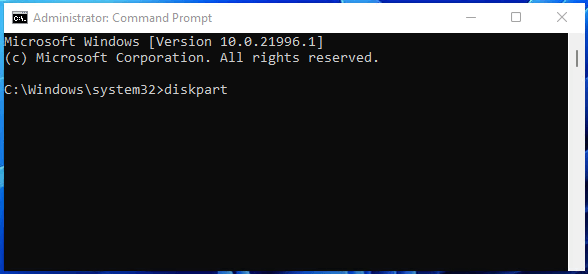
From this, it's clear that diskpart is an interpreting tool that executes disk partitioning commands in Windows disks, partition volumes, and even virtual disks.
Applies to: Windows 11/10/8.1/8/7/XP/Vista and Windows Server 2022/2019/2016/2012 r2/2012/2008, etc.
#3. Partition Manager Software
Partition manager software is a disk partitioning tool that helps you execute basic operations like creating partitions on a physical hard drive, SSD, external storage device, or even a virtual disk.
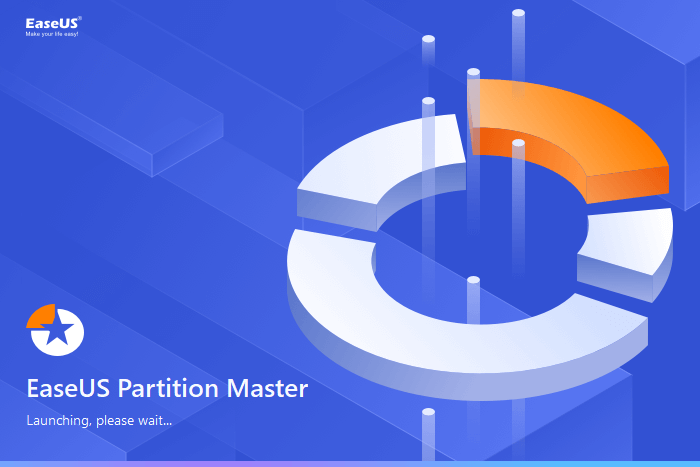
Aside from basic disk management, professional partition manager software like EaseUS Partition Master even supports normal Windows users to execute some advanced operations in Windows systems. For example, with a few simple clicks, you can apply this tool to migrate OS to HDD/SSD, clone disk, convert MBR to GPT, etc.
Applies to: Windows 11/10/8.1/8/7/XP/Vista and all Windows Servers.
So which tool should you select to create partitions on your computer? And if you need to perform further operations on your hard disk or external SSD, which tool should you choose? Check the comparison table below, and it'll help you learn more about these three disk partitioning tools and decide which is easier to apply:
| Partition Tools | Disk Management | Diskpart | EaseUS Partition Manager | |
|---|---|---|---|---|
| Features |
|
|
Basic Features:
|
Advanced Features:
|
| Difficulty Level | Medium | Medium | Easy | |
| Duration | 2 - 20 minutes | 3 - 20 minutes |
|
|
| Pros | Free | Free, command syntax interface | User-friendly interface, advanced partitioning features | |
Which tool suits you better?
- For a free tool for creating partitions, Disk Management, Diskpart, or a free partition manager software can all work.
- Administrators prefer to run Diskpart to fulfill their daily disk partitioning demands.
- For Windows beginners or to refer to a more advanced and powerful partition manager, EaseUS Partition Master stands out to execute diverse tasks.
Briefly, Disk Management, Diskpart, and EaseUS partition manager software are 3 top widely used tools for disk partitionings. Now, you've known what tools you can apply to create partitions or manage disk space easily. You can share this with more people who need help in disk partitioning with this infographic here.
This infographic includes 3 disk partition tools that you may like in 2023 with a basic features and advanced features list:
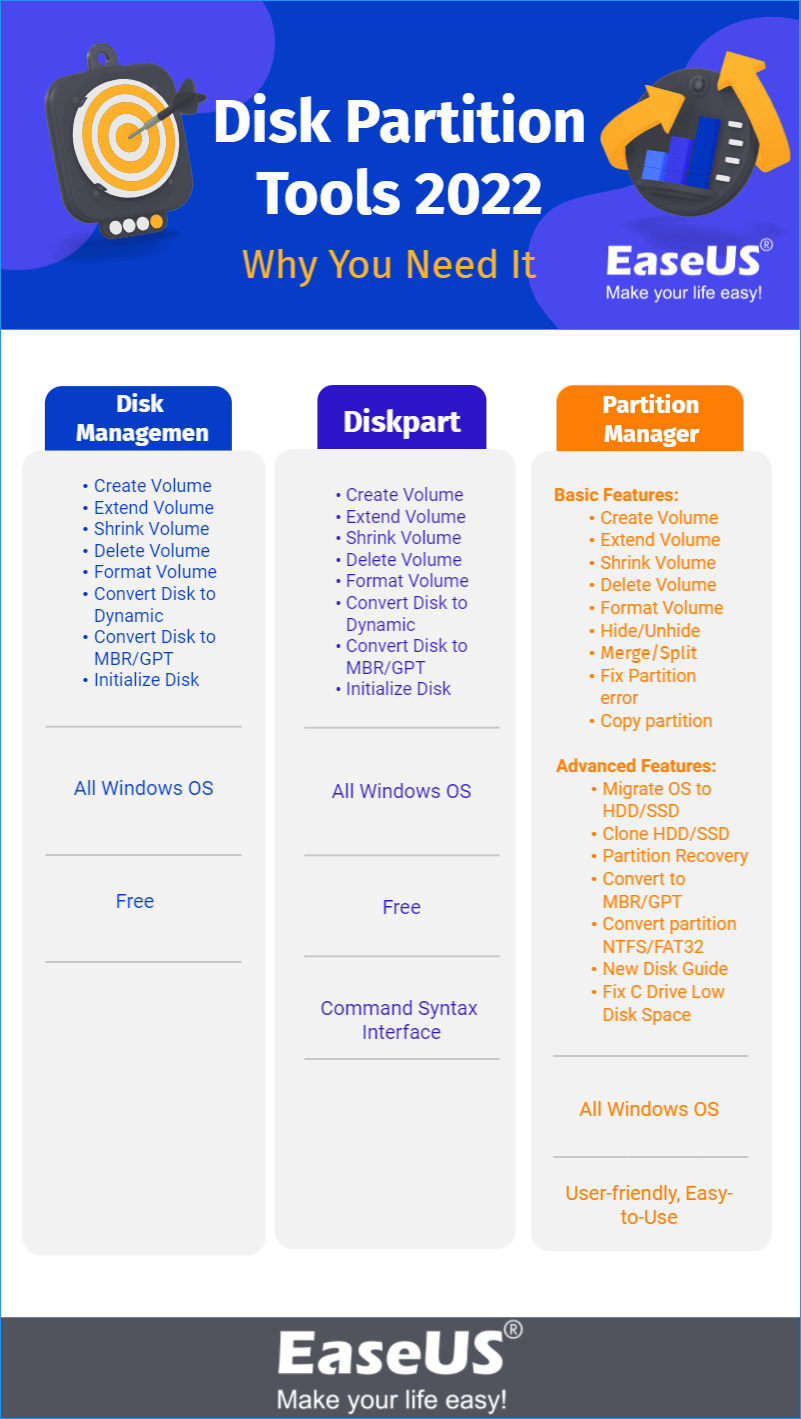
Share this Image On Your Site
Method 1. Create Partition with Disk Management in Windows 11/10/8/7
Step 1. Open Disk Management: Right-click the Windows icon, then click Disk Management.
Step 2. Shrink Partition: Right-click Partition > Select "Shrink Volume" > Determine partition's size and click "Shrink".
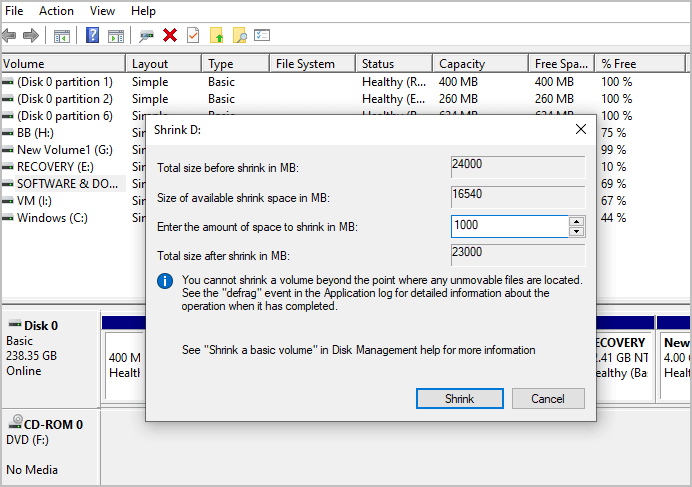
Step 3. Create Partition: Right-click on the unallocated space on your hard disk > select "New Simple Volume" > Next > Enter volume size > Next > Assign the following drive letter > Next > Set file system > Next > Finish.
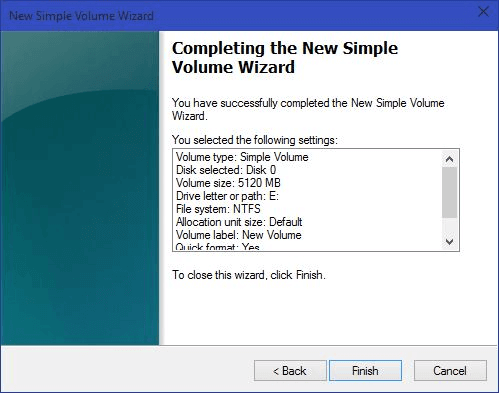
Here this infographic includes the complete process to Create Partition in Disk Management and you may share it to help more people around you:
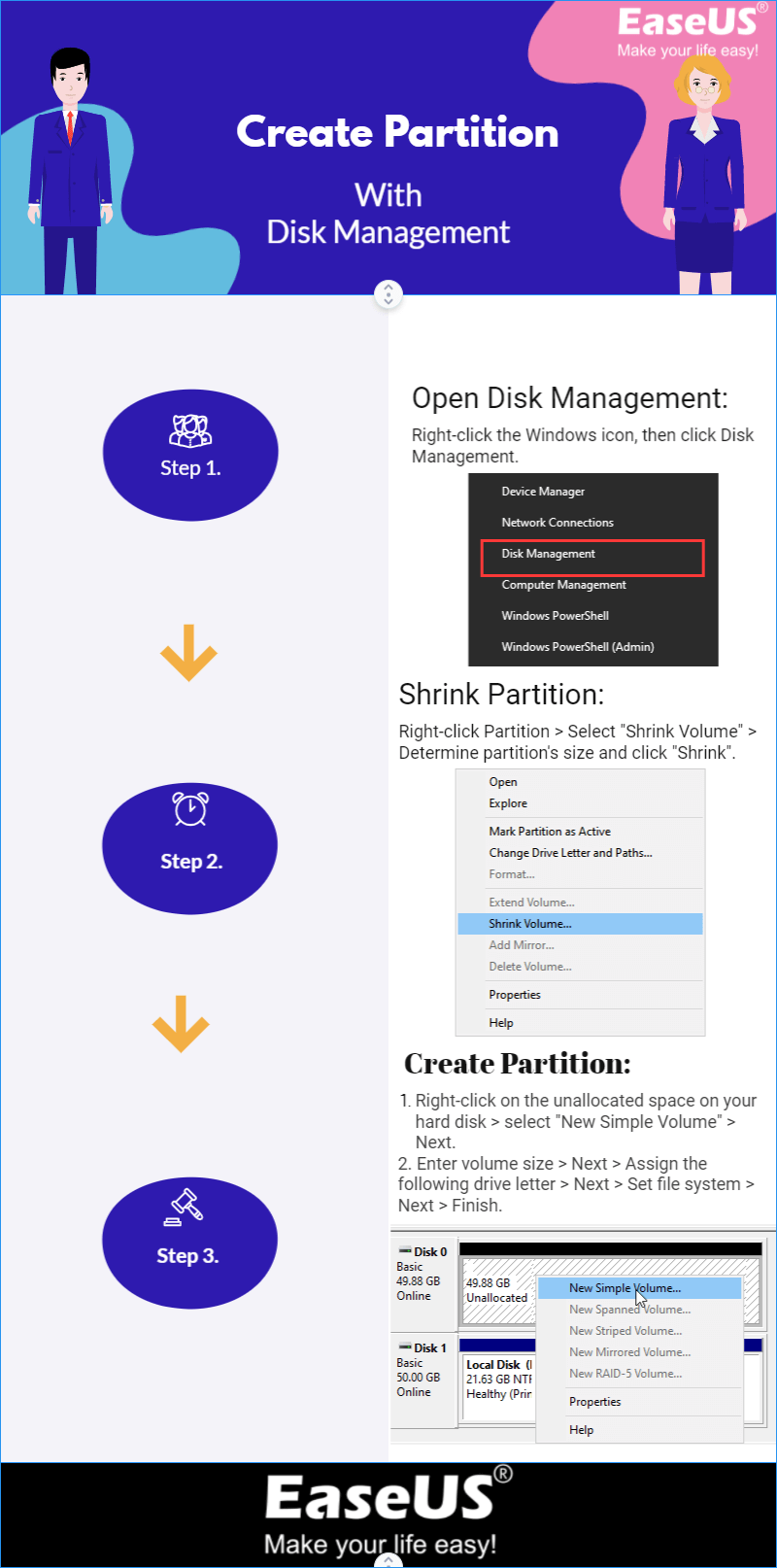
Share this Image On Your Site
Method 2. Use Diskpart to Create Partition in Windows 11/10/8/7
Step 1. Open diskpart.
Type Command Prompt on the search box > Right-click Command Prompt and choose "Run as administrator" > Input diskpart and press Enter.
Step 2. Enter command lines and press Enter each time.
Create primary partition syntax:
- list disk
- select disk * (Replace * with your selected disk.)
- list partition
- create partition primary
- create partition primary size=1024 (1024MB is equal to 1 GB.)
- assign letter=*
- exit
Create logical partition syntax:
- list disk
- select disk *
- create partition extended
- create partition logical size=number
- assign letter=*
- exit
This infographic includes the two access of creating primary partition and create logical partition in Windows using Diskpart. Take a view of this infographic and you can share this with more people who have the same needs over the world:
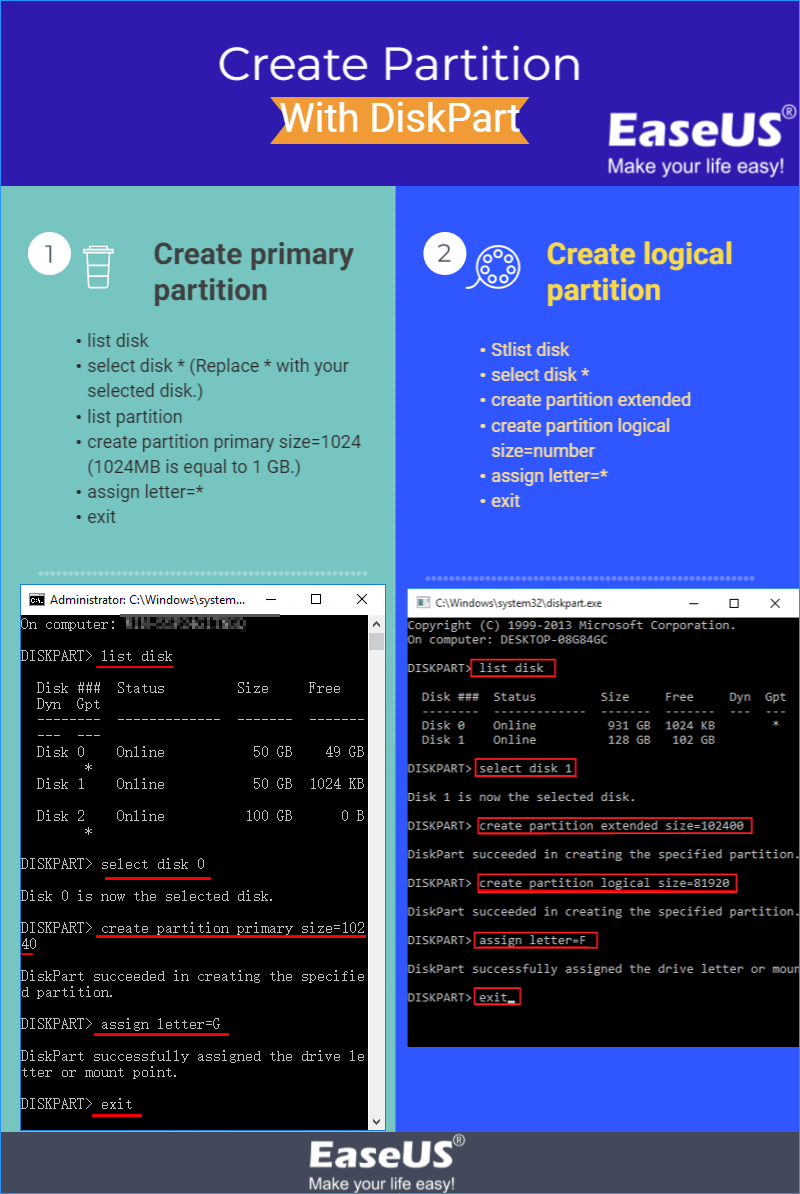
Share this Image On Your Site
Method 3. Run Third-party Partition Manager Software to Create Partition
Step 1. Launch EaseUS Partition Master and check for free space.
Step 2. Shrink a disk partition to create unallocated space.
- Right-click partition and select "Resize/Move".
- Drag the partition handle to shrink size.
- Click OK > Apply.
Step 3. Right-click on the unallocated space and select "Create..." > Customize drive letter, partition label, file system > OK > Apply.
Here this infographic includes the complete procedure of creating partitions using EaseUS Partition Master. The procedure is easy and enjoyable. And you don't need to worry about any data loss issue during the procedure. Check it here:
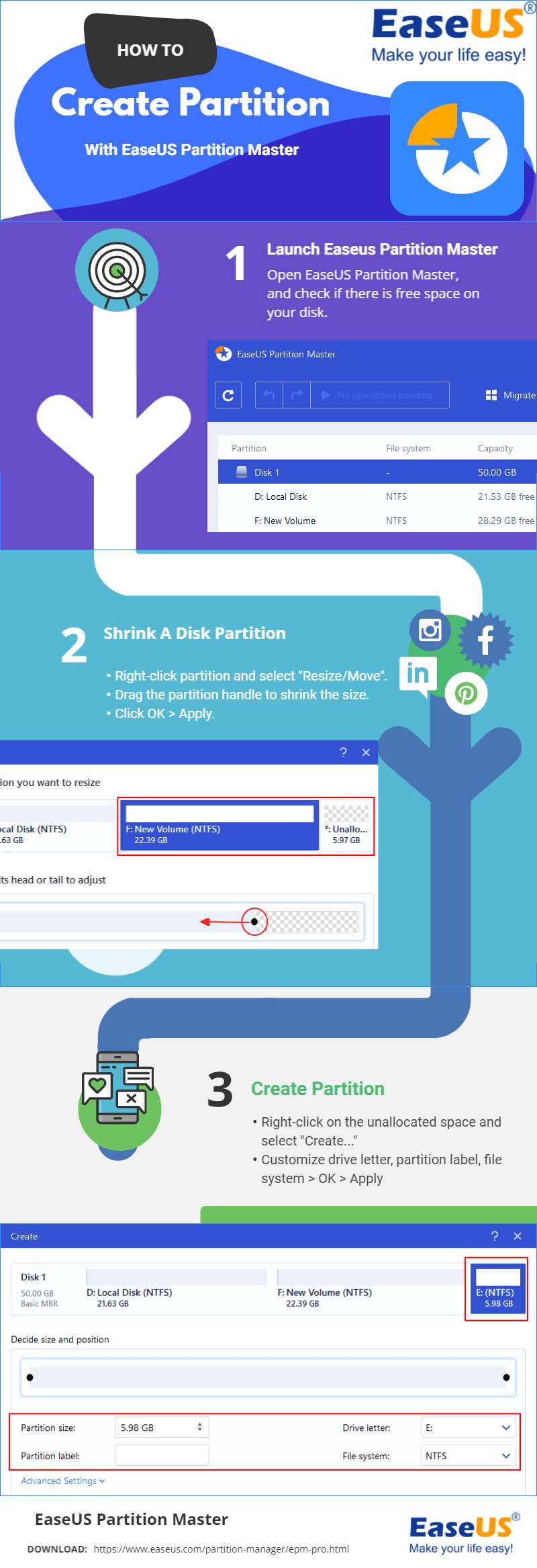
Share this Image On Your Site
Partition Hard Drives in Windows Can Be As Easy As 1-2-3 with a Correct Tool
Disk partitioning is a must for most Windows users, external storage device users, game fans, etc. According to this page, you can get a full overview of 3 partition tools that help you create, resize, delete, format, and even covert partitions on your own.
To grab an efficient way to create partitions on your computer or storage devices, you must first know every well about your computer skills. Briefly, you need to confirm which type of Windows users that you belong to:
1]. Beginners; 2]. Experienced or sophisticated users; 3]. Geeks or developers.
And based on the types of Windows users, we re-sorted these three tools that you can find the suitable partition tools immediately:
- Disk Management - For Beginners
- Diskpart - For Experienced Geeks, and Developers
- EaseUS Partition Manager Software - All Levels of Windows Users.
Recommendation: Alongside all types of disk partitioning tools, for an easy-to-use and efficient way to manage disk space, creating partitions, you can't miss EaseUS Partition Master. It works even better than you can expect.
We summarized the page content about How to Create Partitions in Windows 11/10/8/7/XP/Vista with 3 Disk Partitioning Tools in this infographic as shown here. You can view the pros and cons of each disk partition tool and then quickly decide which tool is what you need. Expect to know the solutions to manage disk partitions like an expert, and you could also be a sharing person to share this informative infographic to help more people around you.
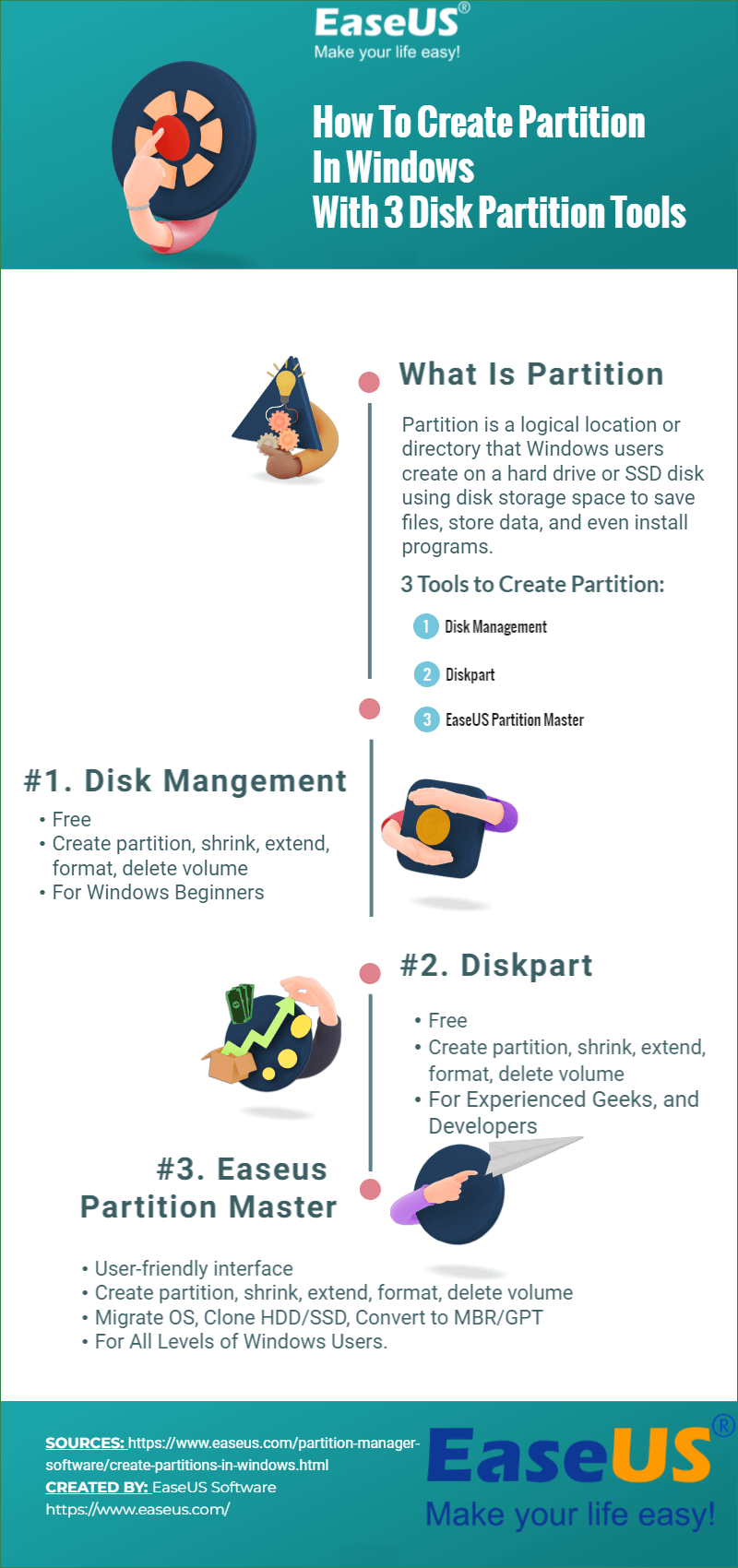
Share this Image On Your Site
How Can We Help You
About the Author
Oliver is an EaseUS professional writer who dares explore new areas. With a passion for solving tech issues with straightforward guides for common users, Oliver keeps honing his writing craft by developing in-depth solutions for disk and partition management, computer boot-up issues, file transfer, etc.
Written by Tracy King
Tracy became a member of the EaseUS content team in 2013. Being a technical writer for over 10 years, she is enthusiastic about sharing tips to assist readers in resolving complex issues in disk management, file transfer, PC & Mac performance optimization, etc., like an expert.
Product Reviews
-
I love that the changes you make with EaseUS Partition Master Free aren't immediately applied to the disks. It makes it way easier to play out what will happen after you've made all the changes. I also think the overall look and feel of EaseUS Partition Master Free makes whatever you're doing with your computer's partitions easy.
Read More -
Partition Master Free can Resize, Move, Merge, Migrate, and Copy disks or partitions; convert to local, change label, defragment, check and explore partition; and much more. A premium upgrade adds free tech support and the ability to resize dynamic volumes.
Read More -
It won't hot image your drives or align them, but since it's coupled with a partition manager, it allows you do perform many tasks at once, instead of just cloning drives. You can move partitions around, resize them, defragment, and more, along with the other tools you'd expect from a cloning tool.
Read More
Related Articles
-
How to Find Hidden Partition or Hide Partition in Windows 10/8/7
![author icon]() Tracy King/2024/10/29
Tracy King/2024/10/29 -
Remove Virus That Slows Down the Computer On Your Own [2024 New]
![author icon]() Tracy King/2024/11/25
Tracy King/2024/11/25 -
Top 7 Best Partition Recovery Software for Windows 11/10/8/7 in 2024
![author icon]() Cedric/2024/10/29
Cedric/2024/10/29 -
How Do I Open/Access Disk Management In Windows 11? All Methods You Can Get
![author icon]() Tracy King/2024/04/22
Tracy King/2024/04/22
Hot Topics in 2024
EaseUS Partition Master
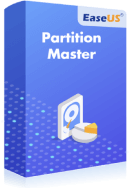
Manage partitions and optimize disks efficiently

